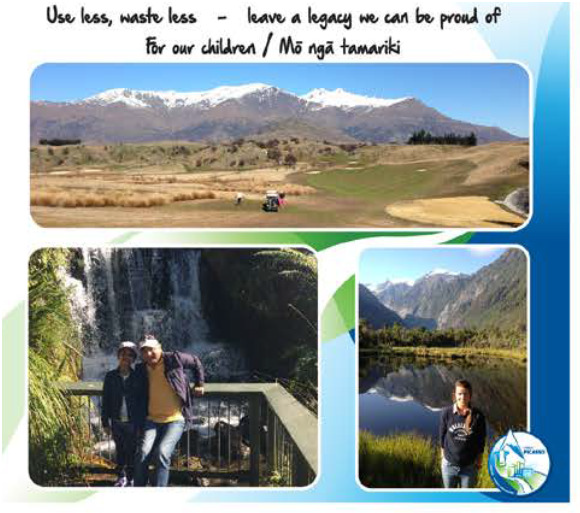
Psoda Supreme Project of the Year Award Winner: Picasso – Fonterra’s Edgecumbe Stormwater and Wastewater Upgrade
At Psoda, we’re proud to support excellence in project management. That’s why we sponsor the Psoda Supreme Project of the Year Award at the annual New Zealand Project Management Awards, presented by the Project Management Institute of New Zealand (PMINZ).
This year we’re honoured to once again highlight a worthy recipient of the award – New Zealand dairy co-operative, Fonterra for Picasso – the upgrade of the stormwater and wastewater networks at its dairy processing site in Edgecumbe in the Bay of Plenty.
This project stands out for many reasons. Not only was it delivered on time and $7 million under budget, it also boasted a great safety and environmental record, plus strong community engagement and stakeholder support.
Crucially, the project also benefited the wider Bay of Plenty community by helping to improve the water quality of the local Rangitaiki River.
And as Fonterra’s largest environmental project to date – with a $61 million budget, taking two years to complete and involving over 400 people, it was used as a catalyst for cultural change in how the organisation approaches environmental performance.
What’s more, all of this was achieved despite the project being impacted by severe flooding in the area in 2017.
Read on to find out more about project Picasso and why it was crowned as the Psoda Supreme Project of the Year Award winner.
Improving environmental performance
With its formation in 2001, Fonterra inherited a legacy of industrial sites with aging infrastructure. This included Edgecumbe dairy processing site which had challenges with its existing infrastructure and achieving environmental control and management compliance.
The multi-million dollar Picasso project was established to upgrade the site’s aging stormwater and wastewater network, as well as to deliver sustainable and improved environmental performance.
Wastewater to nutrients for farmland
As part of Fonterra’s commitment to improved water quality, the aim of the upgrade was to improve the water quality of the nearby Rangitaiki River for the benefit of the wider Bay of Plenty community.
To achieve this, discharge into river would be reduced by redirecting wastewater nutrients from the site to local farmland using irrigation. The scope of the programme included:
- A capital budget $61 million with a project duration of two years
- Upgrade of the stormwater network by August 2018
- First flush system 250,000 litre tank and pump station with approximately 2km of underground pipes
- Upgrade and expansion of the wastewater spray irrigation network by August 2018 covering around 15km of underground pipe crossing waterways and the main town
- About 15km of transfer lines across the local community
- Establishment of six new farms for irrigation, including building partnerships, establishing agreements, and installation of irrigation networks on third party land
- Reduction of river discharge to improve water quality by August 2018
- Operational readiness of team to achieve improved environmental performance
Catalyst for cultural change
The project was also used as a catalyst for cultural change both at the site and within Fonterra to raise awareness of environmental impacts of the day-to-day decisions by operators.
The project team recognised the need for behavioural change early on, realising physical infrastructure was only part of the solution and that environmental performance was reliant on behaviours.
Challenges and complexity
The project had to overcome several key challenges including:
- Legacy infrastructure
- A large number of live underground services – some unknown and with historic damage
- The condition of existing assets and network
- Construction within am existing operating site, while managing food safety and quality requirements
- A dairy processing site with high risk activities, hazard material storage and chemical unloading
- Environmental challenges including contaminated soil, high water table, geotechnical seismic risk
- Embedding an understanding and appreciation of the risks and opportunities of effective stormwater and wastewater management within the operations team.
Edgecumbe floods
The severe floods in Edgecumbe in April 2017, had a profound impact on the project. Not only was the team’s ability to implement the project affected, but team members were also impacted more personally, along with the wider community. Homes were damaged, and some lost, as well as damage farms and fencing and strong concerns for animal stock.
To overcome these challenges, the Picasso team banded together to support staff, contractors and the community. This included support for emergency services and providing and operating equipment and pumps, as well as assisting farmers and moving stock.
Expectations on the project timeline were also re-aligned with contracting partners to reduce pressure following the flood, and support and well-being checks were provided, while the overall long-term timeline was maintained.
The team worked alongside the community, and contracting partners throughout this extreme event, with the collaborative nature of the team inherent in how this was approached.
Local community engagement
The level of community engagement involved in the project is cited as one of its stand-out features.
Community relations were sensitive at the start. The project was the first significant investment at the Edgecumbe plant in many years and past environmental performance at the site had caused sensitivities within the community.
Starting in such a challenging environment, the project team was committed to improve the site’s environmental performance and create sustainable change within the site that would benefit the community.
The planned capital works also had the potential to be disruptive, as they were not limited to the Fonterra site, but also across the community with 15km of pipelines and works across 1200ha of local farmland.
It was clear that delivery of the project without the support of the community would be difficult. The team made an early decision to ensure they engaged effectively and often with the community. It implemented a comprehensive community engagement plan, which helped the team develop relationships with the community, as well as our other external stakeholders such as farmers, local iwi and the regional council.
Overall success factors
Overall, the project team attributes the success of the project to recognising the need for technology, process and systems to combine with cultural and organisational change.
In its award submission, the team states:
“We recognised that environmental performance is reliant on behaviours, focused on creating a collaborative atmosphere, where people were connected to the project via hearts and minds to create sustainable change. A combination of technology, process and people culture, came together to deliver lasting change for the Edgecumbe site and the local community.
This was a project where our success demonstrated the value of investing in people to create enduring behavioural change, as well as infrastructure, to create real value for both environment and community.”
Judges’ comments
The PMINZ New Zealand Project Management Awards judges had the following to say about the project:
“The Picasso project is a great example of putting people first. It was a very complex project involving a large group of stakeholders. The project managers proactively managed environmental, technical and stakeholder issues.
“The site constraints, natural hazards and coordination within project teams provided some challenging feats for this project. They were creative in how they involved the community. Challenges was significant and the judges was impressed with how deeply they went into community issues and dealt with it.
“The project employed a range of project management methodologies and risk management approaches to address engineering and environmental challenges and it was the engagement with stakeholders that really stood out for the panel.”


